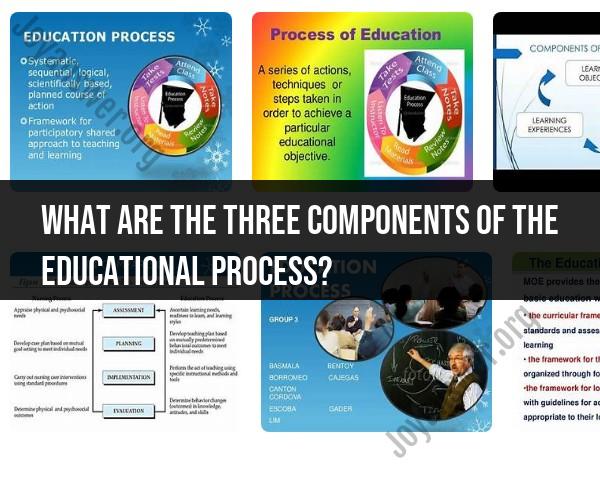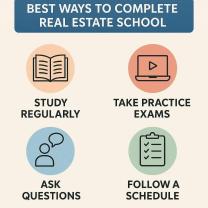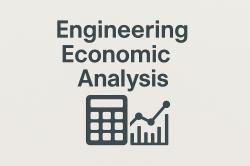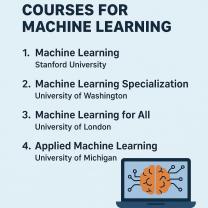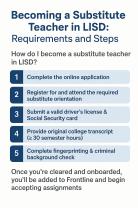What are the three components of the educational process?
The educational process is a complex and multifaceted endeavor, but it can be broken down into three key components, often referred to as the "three pillars" of education. These components are fundamental to the successful delivery of education and the development of learners:
Content:
- Content is the subject matter, knowledge, and information that is being taught. It encompasses the curriculum, textbooks, instructional materials, and the specific topics or subjects that students are expected to learn. Content provides the foundation for education and defines what students should know and be able to do. It varies depending on the level of education and the specific educational goals, whether it's mathematics, science, history, literature, or any other discipline.
Pedagogy:
- Pedagogy refers to the methods and strategies used by educators to teach and facilitate learning. It includes instructional techniques, teaching styles, classroom management, and the overall approach to delivering content to students. Effective pedagogy takes into account the diverse learning styles and needs of students, using a variety of teaching methods, such as lectures, group discussions, hands-on activities, technology integration, and more. Pedagogy is about how educators engage students with the content, make it accessible, and promote understanding and skill development.
Assessment:
- Assessment involves the ongoing process of evaluating and measuring students' learning, progress, and achievements. It helps educators and students gauge the effectiveness of the teaching and learning process. Assessments can take various forms, including quizzes, tests, projects, presentations, and more. They serve to provide feedback to both teachers and students, guide instruction, and inform decisions about how to support students in their learning journey. Assessment also plays a critical role in accountability and helping to determine whether educational goals are being met.
These three components are interconnected and interdependent. Effective education requires a well-balanced combination of relevant content, appropriate pedagogical approaches, and meaningful assessment practices. The goal is to ensure that students not only receive information but also comprehend, apply, and retain that knowledge, which ultimately leads to meaningful learning and skill development. A strong educational process addresses these components in a coordinated and student-centered manner to promote successful learning outcomes.
1. What are the three key components of the educational process?
The three key components of the educational process are:
- Instruction: Instruction is the process of delivering knowledge and skills to students. It can be done through a variety of methods, such as lectures, discussions, demonstrations, and hands-on activities.
- Assessment: Assessment is the process of measuring student learning. It is used to identify strengths and weaknesses, track progress over time, and make decisions about instruction.
- Curriculum: Curriculum is the set of knowledge and skills that students are expected to learn. It is developed based on state and national standards, and it is typically organized into subjects and grade levels.
How do instruction, assessment, and curriculum interact in the educational system?
Instruction, assessment, and curriculum interact in a complex and dynamic way. Effective instruction is based on a sound understanding of curriculum and assessment. Assessment results can be used to inform instruction, and instruction can be used to prepare students for assessment.
Here is an example of how the three components interact:
- A teacher is planning a unit on the American Revolution.
- The teacher begins by reviewing the state standards for social studies. This helps the teacher to identify the key knowledge and skills that students are expected to learn.
- The teacher then develops a unit plan that includes a variety of instructional activities, such as lectures, discussions, and hands-on activities.
- The teacher also develops assessments to measure student learning. These assessments may include quizzes, tests, and projects.
- The teacher uses the results of the assessments to inform instruction. For example, if the teacher sees that students are struggling with a particular concept, the teacher may provide additional instruction or support.
How to optimize the educational process by aligning these three components effectively?
One way to optimize the educational process is to align instruction, assessment, and curriculum effectively. When these three components are aligned, students are more likely to learn and succeed.
Here are some tips for aligning instruction, assessment, and curriculum:
- Make sure that instruction is based on the curriculum. The teacher should plan instruction that covers the key knowledge and skills that students are expected to learn.
- Use assessment results to inform instruction. The teacher should use the results of assessments to identify strengths and weaknesses, track progress over time, and make decisions about instruction.
- Provide students with feedback on their work. Feedback should be specific, timely, and actionable.
- Use a variety of instructional methods. Students learn in different ways, so it is important to use a variety of instructional methods.
- Provide students with opportunities to practice what they have learned. Students need opportunities to practice new skills and apply new knowledge in order to learn and retain information.
By aligning instruction, assessment, and curriculum, teachers can create a more effective and engaging learning environment for all students.
